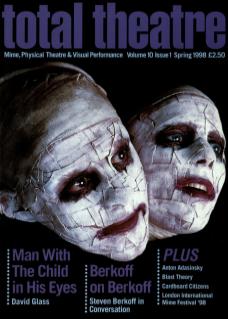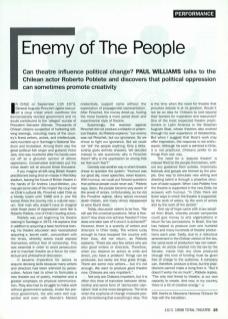In Chile on 11 September 1973, General Augusto Pinochet Ugarte executed a coup d'état which overthrew the democratically elected government and no doubt contributed to the alleged suicide of President Salvador Allende. Thousands of Chilean citizens suspected of harbouring left-wing leanings, including many of the country's finest writers, actors, and intellectuals, were rounded-up in Santiago's National Stadium and brutalised. Among them was the great political folk singer and guitarist Victor Jara, who was murdered after his hands were cut off as a ghoulish symbol of artistic oppression. Conservative estimates put the initial death toll at around three thousand.
If you imagine all left-wing British theatre practitioners being shot en masse in Wembley stadium, leaving the future of British theatre in the hands of Sir Andrew Lloyd Webber, you may get some idea of the impact the coup had on Chile's cultural life. Pinochet ruled Chile as a bloody tyrant until 1989 and in one fell swoop threw the country into a cultural vacuum. One man who doesn't have to imagine what those years of oppression were like is Roberto Poblete, one of Chile's leading actors,
Poblete was just beginning his theatre training in Santiago in 1973. He explains that in addition to acquiring a basic technical training, his theatre education also necessitated acquiring a 'secret code', concomitant with the times, whereby actors could express themselves without fear of censorship. This was essential in order to avoid persecution and to maintain theatre as a forum for intellectual and philosophical discussion.
It became imperative for actors to acquire devising skills because many writers and directors had been silenced by persecution. Actors had to strive to formulate a new theatre out of poetry, metaphor, and a greater emphasis on physical communication. They also had to struggle to make work without government subsidy. Under the previous government, the arts were well supported and even with Allende's Marxist credentials, support came without the expectation of propagandist representation. After Pinochet, the money dried-up, fuelling the move towards a more pared down and experimental style of theatre.
Surprisingly, the reaction against Pinochet did not produce a didactic or polemical theatre. As Poblete explains: ‘our enemy was not Pinochet, but our ignorance. So we chose to fight our ignorance. But we could not tell the people anything. Only a dictatorship gives definite answers. We decided instead to ask questions: why is Pinochet there? Why is the oppression so strong that we feel such fear?’
Comedy was another way in which theatre chose to question the system. ‘Humour was our great ally, never speeches, never lessons. With humour, we could put forward questions that political people could never ask,’ Poblete says. Soon, the people became very aware of the power of actors. Unfortunately, so too did the Pinochet regime. Many actors received death threats, and many others disappeared or were found dead.
Today, discussion seems to be free. ‘We still ask the universal questions. What is freedom? How does one achieve freedom? How does one take care of it once it is achieved?’ However, there is a scarcity of writers and directors in Chile today. The writers lucky enough to have escaped the country with their lives, did not return, as Poblete explains: ‘There are very few actors who are also good writers or directors. Therefore, when you depend on actors to write and direct, you have a problem! Things can be produced, but rarely are they great things. There are some new writers... but it's not enough. We want to produce good theatre now. Chileans are very impatient.’
Not only are Chileans impatient, but it is often this time of transition between dictatorship and some form of 'democratic capitalism' that is the most dangerous. The time when the euphoria of change misleads people into believing that everything's okay. This is the time when the need for theatre that provokes debate is at its greatest. Would it not be an idea for Chileans to look beyond their borders for inspiration and resources? One of the most respected theatre practitioners in Latin America is the Brazilian Augusto Boal, whose theories also evolved through his own experience of dictatorship. But when I suggest that Boal's work may offer inspiration, the response is not enthusiastic. Although his work is admired in Chile, it is not practiced. Chileans prefer to do things their own way.
The need for a 'popular theatre' is instead filled by the people themselves, with out any guidance from outside. Impromptu festivals and groups are formed by the people. One way to stimulate new writing and directing talent is through a proactive structure of state support. When I ask Poblete how the theatre is supported in the new Chile, he answers with humour, ‘In Chile there are three ways in which the theatre is supported: by the work of actors, by the work of actors and by the work of the actors!’
One ray of hope came with a law adopted from Brazil, whereby private companies could give money to arts organizations in return for tax concessions. In Brazil, this law has helped to produce over one hundred films and many hundreds of theatre productions each year. Sadly, due to a ridiculous amendment in the Chilean version of the law, the same level of production has not materialised. An article inserted into the law by the Senate, insists that any show produced through this kind of funding must be given free of charge to the audience. A company can, therefore, produce a show, but the practitioners cannot make a living from it. ‘But it doesn't worry me so much,’ Poblete replies. ‘The only real threat to theatre, is our own capacity to create. And now, in my country, there is a lot of creative energy.’
With thanks to Macarena Herreros Tichauer for help with the translation.

